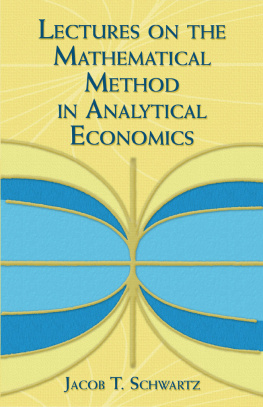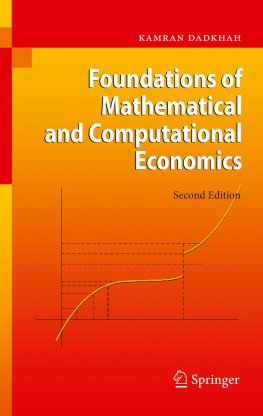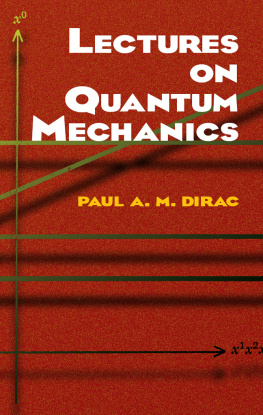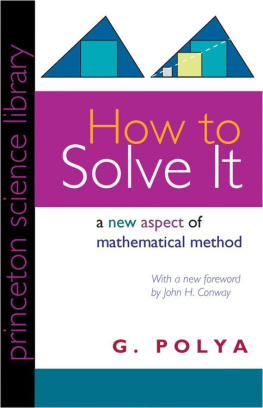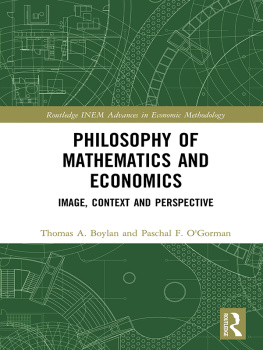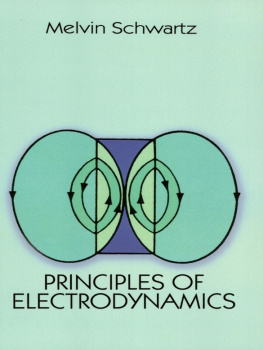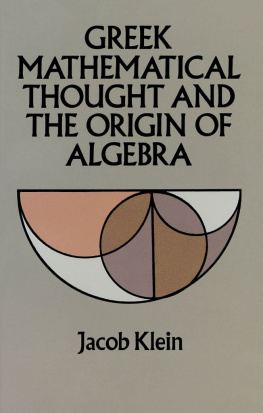Jacob T. Schwartz - Lectures on the Mathematical Method in Analytical Economics
Here you can read online Jacob T. Schwartz - Lectures on the Mathematical Method in Analytical Economics full text of the book (entire story) in english for free. Download pdf and epub, get meaning, cover and reviews about this ebook. year: 2018, publisher: Courier Publishing, genre: Romance novel. Description of the work, (preface) as well as reviews are available. Best literature library LitArk.com created for fans of good reading and offers a wide selection of genres:
Romance novel
Science fiction
Adventure
Detective
Science
History
Home and family
Prose
Art
Politics
Computer
Non-fiction
Religion
Business
Children
Humor
Choose a favorite category and find really read worthwhile books. Enjoy immersion in the world of imagination, feel the emotions of the characters or learn something new for yourself, make an fascinating discovery.
- Book:Lectures on the Mathematical Method in Analytical Economics
- Author:
- Publisher:Courier Publishing
- Genre:
- Year:2018
- Rating:4 / 5
- Favourites:Add to favourites
- Your mark:
- 80
- 1
- 2
- 3
- 4
- 5
Lectures on the Mathematical Method in Analytical Economics: summary, description and annotation
We offer to read an annotation, description, summary or preface (depends on what the author of the book "Lectures on the Mathematical Method in Analytical Economics" wrote himself). If you haven't found the necessary information about the book — write in the comments, we will try to find it.
Lectures on the Mathematical Method in Analytical Economics — read online for free the complete book (whole text) full work
Below is the text of the book, divided by pages. System saving the place of the last page read, allows you to conveniently read the book "Lectures on the Mathematical Method in Analytical Economics" online for free, without having to search again every time where you left off. Put a bookmark, and you can go to the page where you finished reading at any time.
Font size:
Interval:
Bookmark:
LECTURES ON THE
MATHEMATICAL METHOD IN ANALYTICAL ECONOMICS
JACOB T. SCHWARTZ
DOVER PUBLICATIONS, INC.
MINEOLA, NEW YORK
To My Father
Bibliographical Note
This Dover edition, first published in 2018, is an unabridged republication of the work originally published as Volume 1 in the Mathematics and Its Applications series by Gordon and Breach, Science Publishers, Inc., New York, in 1961.
Library of Congress Cataloging-in-Publication Data
Names: Schwartz, Jacob T., author.
Title: Lectures on the mathematical method in analytical economics/ Jacob T. Schwartz.
Description: Mineola, New York : Dover Publications, 2018. | Series: Dover books on mathematics
Identifiers: LCCN 2018010154| ISBN 9780486828039 (paperback) | ISBN 0486828034
Subjects: LCSH: Economics, Mathematical. | BISAC: MATHEMATICS /Applied.
Classification: LCC HB171 .S387 2018 | DDC 330.01/5195dc23
LC record available at https://lccn.loc.gov/2018010154
Manufactured in the United States by LSC Communications
82803401 2018
www.doverpublications.com
Contents
Preface
Mathematical economics has made immense technical progress in the last twenty years. Unfortunately, it has to a too large extent remained isolated within the larger historical context of economic debate, somehow ignoring rather than clarifying the great issues around which this debate has raged; like a delicate precision clockwork which the economist admires, as in a jewelers window, before setting back to serious work with pick and shovel. For this reason I have tried, in the lectures from which the present volume is taken, to direct attention particularly to these issues, and have attempted to put economics in the foreground and mathematics together with mathematical rigor in the backgroundalthough, alas, mathematics in doing its good services has a way of calling attention to itself. Where perfect generality has meant relative vagueness of results, while reasonable assumptions have led to suggestive conclusions, I have, in consequence, preferred to make rather than to omit these assumptions.
Our treatment begins with the Leontief input-output model, which develops as a general framework for all that is to follow. After an introductory treatment of price theory in the Leontief model, we pass to a consideration of business-cycle theory, following the ideas pioneered by Lloyd Metzler and attempting their extension. This, in turn, leads us into the realm of notions associated with the name of Keynes; the input-output path along which we approach these ideas emphasizes, besides their dynamic foundations, the fact that they are less necessarily purely aggregative than is commonly suggested. Finally, we turn what we have learned into a critique of the general equilibrium approach which Walras built up as the final form of the theory of supply and demand, attempting to bring the notions of Walras and the notions of Keynes to an unbiased confrontation. With this we conclude.
He who reads the preface of a mathematical work is apt to have in mind the troublesome question of mathematical prerequisites to the reading of the text. These are as follows. Matrices and vectors is a subject which is more and more a standard elementary tool for the economist. The reader of the present work is expected to be familiar with the basic theory of matrices and linear transformations as it is set forth in Finkbeiners Introduction to Matrices and Linear Transformations (Freeman, 1960), in Halmos Finite Dimensional Vector Spaces (Van Nostrand, 1958), in Appendix A to the first volume of Karlins Mathematical Methods and Theory in Games, Programming, and Economics (Addison-Wesley, 1959) or, for that matter, in any one of a number of quite satisfactory recent texts on this subject. A reasonable working knowledge of elementary calculus is also assumed. From time to time we use some more abstruse mathematical theorem; perhaps a fixed point theorem, perhaps some other. In these cases, a careful statement of the theorem, and a reference to its proof, will be given.
In order to keep our feet on the ground, we have made frequent reference to statistical and empirical data, intending that the approximate size of the quantities which our theoretical analysis reveals as significant should be estimated. The econometrically oriented economist is apt to be horrified by our rude reductions of his careful and accurate econometric headings. I wish to plead three circumstances in extenuation of the statistical sins which are to be committed in what follows. In the first place, as has already been said, only approximate estimates are aimed at. In the second, the empirically evolved headings in econometric tables and time-series are rarely exactly those of which our theoretical analysis makes us wish to be informed, so that a process of interpolation and surmise is inevitable in any case. Desiring rough estimates, we have carried through this process of estimation and surmise ruthlessly. Finally, in view of the two reasons already given, it seemed less reasonable to hunt at length through a vast and often uncertain statistical literature for data that might improve our accuracy, than to rest content with less accurate estimates made from readily available data.
I have tried in the final exposition to preserve the somewhat colloquial style of a lecture series, rather than transforming this into the cold polish of ordinary scientific exposition.
I should like to thank Mr. A. C. Williams of the research division of the Socony-Mobil Oil Company for his patient and deeply thoughtful work in elaborating the lecture notes from which the present work has developed, and Dr. John Muth of the Carnegie Institute of Technology and Mr. Arnold Faden of Columbia University for their very instructive suggestions and criticisms. The errors that remain in the present work are, of course, my own invention. I should like to thank Mr. Ralph Knopf for assistance with proof-reading, and Miss Ursula Burger for her quite exceptional intelligence, speed, and devotion in typing the manuscript. Acknowledgment is also made to the authors and publishers of the works cited: to the Yale University Press for permission to quote from L. Von Mises Human Action; to the D. Van Nostrand Company for permission to quote Henry Hazlitts The Failure of the New Economics; to Ruth Mack and the National Bureau of Economic Research for permission to quote Miss Macks Consumption and Business Fluctuations; to Harcourt, Brace & World, Inc. for permission to quote J. M. Keynes General Theory of Employment, Interest, and Money; and to the Encyclopaedia Britannica for permission to quote remarks of Prof. F. H. Knight. Finally, I should like to thank the Alfred P. Sloan Foundation for its support during the period in which this book was written.
JACOB T. SCHWARTZ
Paris, August 1961
PART A
The Leontief Model and the Technological Basis of Production
LECTURE1
Introduction and Outline
What Will and What Will Not Be Treated
Mathematical economics currently includes, and perhaps is even dominated by, a number of branches with which we will have little to do. Thus, in order to define the subject of the present lectures, it is well to say something about these excluded branches. One topic that we shall not discuss to any great length is the subject that might be called efficiency economics in general, and is often called by the several names of its principal techniqueslinear programming, operations research, perhaps also theory of games. In these subjects, the aim is to find the optimal adjustment, in one or another sense, to a given situation; they refer with greatest cogency and success to the profit-making possibilities of a single firm. As an omnibus reference to this area of thought let me cite Vajdas
Next pageFont size:
Interval:
Bookmark:
Similar books «Lectures on the Mathematical Method in Analytical Economics»
Look at similar books to Lectures on the Mathematical Method in Analytical Economics. We have selected literature similar in name and meaning in the hope of providing readers with more options to find new, interesting, not yet read works.
Discussion, reviews of the book Lectures on the Mathematical Method in Analytical Economics and just readers' own opinions. Leave your comments, write what you think about the work, its meaning or the main characters. Specify what exactly you liked and what you didn't like, and why you think so.

